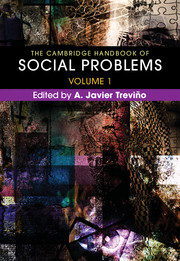Book contents
- The Cambridge Handbook of Social Problems
- The Cambridge Handbook of Social Problems
- Copyright page
- Contents
- About the Contributors
- Introduction
- Part I General Concerns and Orientations in the Study of Social Problems
- Part II Historical and Theoretical Issues in the Study of Social Problems
- Part III Problems of Discrimination and Inequality
- Chapter 17 Racism
- Chapter 18 Immigration
- Chapter 19 Gender Inequality
- Chapter 20 Sexualities and Homophobia
- Chapter 21 Poverty and Income Inequality: A Cross-National Perspective on Social Citizenship
- Chapter 22 Housing Market Discrimination
- Chapter 23 Hunger and Food Insecurity
- Chapter 24 Ageism, Past and Present
- Chapter 25 Disabilities
- Part IV Problems of Institutions
- Index
- References
Chapter 20 - Sexualities and Homophobia
from Part III - Problems of Discrimination and Inequality
Published online by Cambridge University Press: 16 March 2018
- The Cambridge Handbook of Social Problems
- The Cambridge Handbook of Social Problems
- Copyright page
- Contents
- About the Contributors
- Introduction
- Part I General Concerns and Orientations in the Study of Social Problems
- Part II Historical and Theoretical Issues in the Study of Social Problems
- Part III Problems of Discrimination and Inequality
- Chapter 17 Racism
- Chapter 18 Immigration
- Chapter 19 Gender Inequality
- Chapter 20 Sexualities and Homophobia
- Chapter 21 Poverty and Income Inequality: A Cross-National Perspective on Social Citizenship
- Chapter 22 Housing Market Discrimination
- Chapter 23 Hunger and Food Insecurity
- Chapter 24 Ageism, Past and Present
- Chapter 25 Disabilities
- Part IV Problems of Institutions
- Index
- References
Summary
Historically, social norms have emphasized procreative sex within the context of a stable union, most often marriage. While homosexuality and other forms of nonprocreative sex have long been viewed as deviant, they have not always been outlawed. As sexual behaviors became increasingly linked to people's identity, new measures were introduced to restrict so-called deviant sexual expression. This connection between sexual behavior and identity gave rise to homophobia as well as to tightening restrictions on sexualities, particularly female sexualities. Homophobia takes many forms, and beginning in the 1950s in the United States, public policies were created granting explicit permission to fire federal employees on grounds of “sexual perversion.” As US society has shifted its views about sexuality and normative sexual practices, research on sex and sexualities has evolved. Problems, however, continue to exist in the areas of sexualities, most notably for those with female, non-gender-conforming, adolescent, and/or black and brown bodies.
Information
- Type
- Chapter
- Information
- The Cambridge Handbook of Social Problems , pp. 363 - 384Publisher: Cambridge University PressPrint publication year: 2018
